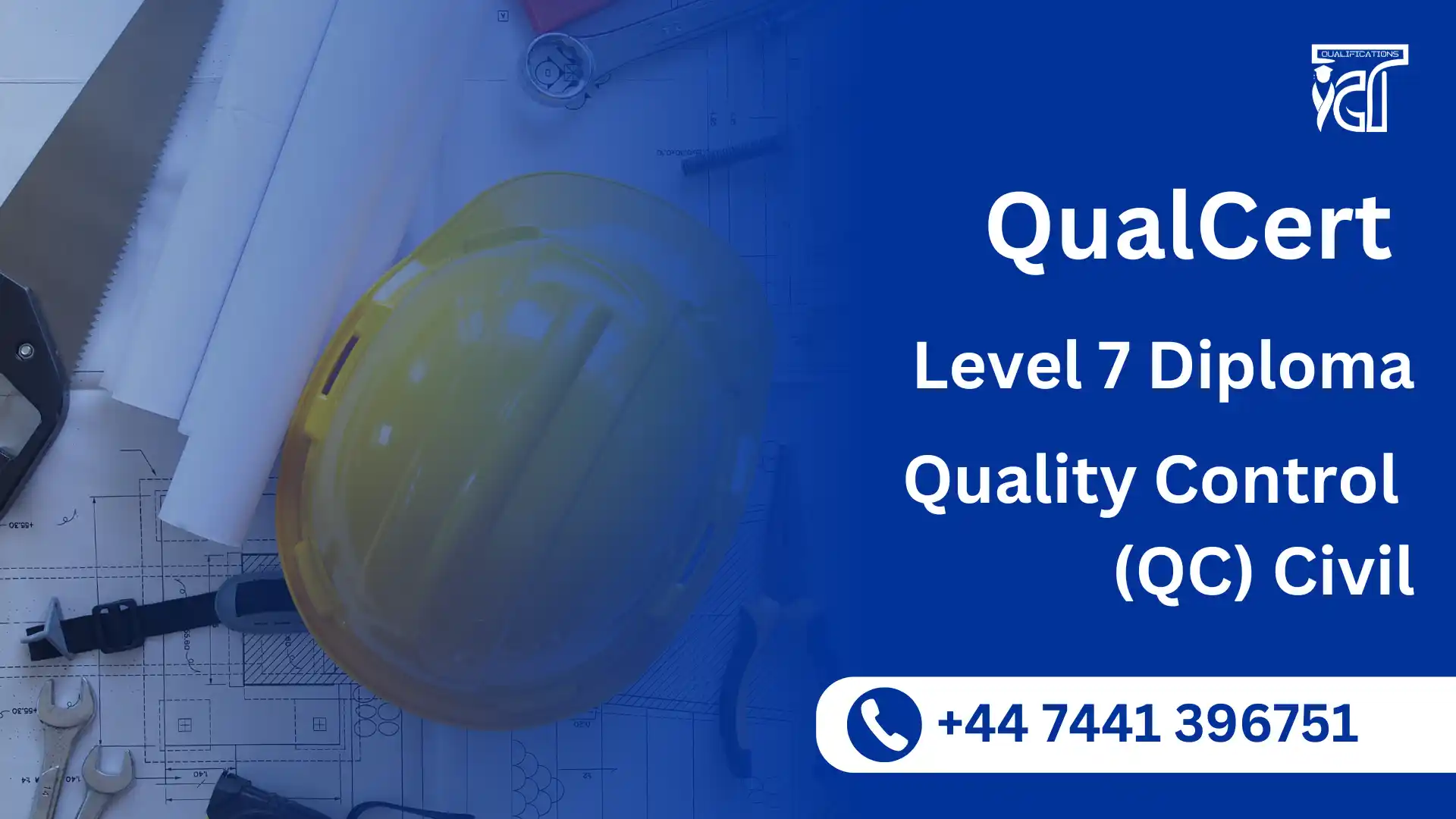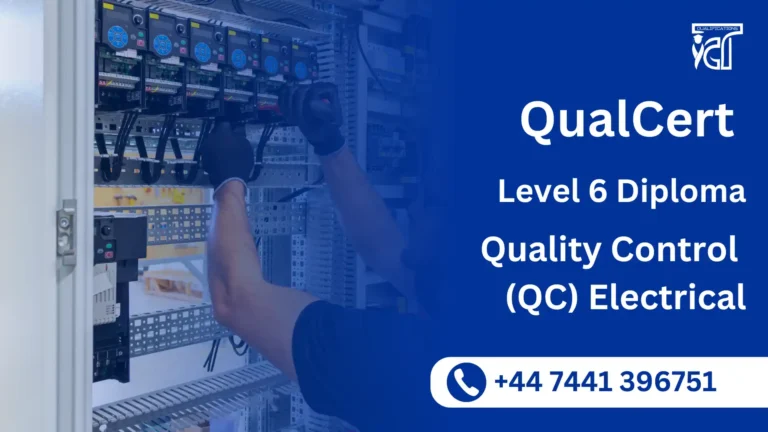The QualCert Level 7 Diploma in Quality Control (QC) – Civil is an advanced qualification designed for experienced professionals and engineers seeking to specialize in quality control practices within the civil engineering and construction sectors. This comprehensive program equips learners with in-depth knowledge and advanced skills in quality planning, materials inspection, site auditing, and regulatory compliance specific to civil infrastructure projects.
Developed to meet international quality management standards, the course is ideal for individuals aiming to take on senior roles in quality control, site supervision, and construction quality management. It blends theoretical knowledge with practical application, focusing on real-world challenges encountered in large-scale infrastructure, roadworks, bridges, buildings, and public works projects.
Whether you’re a civil engineer, quality manager, site supervisor, or technical auditor, this diploma empowers you to lead with confidence in ensuring quality assurance across all stages of civil engineering projects.
QualCert Level 7 Diploma in Quality Control (QC) Civil
The QualCert Level 7 Diploma in Quality Control (QC) Civil is structured to provide a comprehensive foundation in quality control practices specific to civil engineering. Below is the qualification structure, including the Total Qualification Time (TQT) 1200, Guided Learning Hours (GLH) 600, and 120 Credits associated with the program.
| Unit Ref# | Unit Title | Credit | GLH | TQT |
| QC090013 – 1 | Quality Engineering and Advanced Risk Management | 20 | 100 | 200 |
| QC090013– 2 | Application of Artificial Intelligence in QC | 20 | 100 | 200 |
| QC090013– 3 | Regulatory Frameworks for International Projects | 20 | 100 | 200 |
| QC090013– 4 | Leadership in Construction Quality Management | 20 | 100 | 200 |
| QC090013– 5 | Strategic Decision-Making in QC Implementation | 20 | 100 | 200 |
| QC090013– 6 | Research Project in Advanced QC Techniques | 20 | 100 | 200 |
GLH (Guided Learning Hours) and TQT (Total Qualification Time) are terms commonly used in vocational qualifications to help define the amount of time a learner is expected to spend on their studies.
1. GLH (Guided Learning Hours)
GLH refers to the number of hours a learner spends being directly taught, supervised, or supported during their course. This includes the time spent in activities such as:
- Classroom instruction
- Practical workshops
- One-on-one tutoring or mentoring sessions
- Online learning sessions with tutor support
In other words, GLH represents the time that learners are actively engaged with their instructors or learning activities.
2. TQT (Total Qualification Time)
TQT represents the total amount of time a learner is expected to invest in completing a qualification, including:
- GLH (Guided Learning Hours): Time spent on direct learning, as explained above.
- Self-Directed Learning: This includes time spent on independent study, research, assignment completion, preparation for exams, and any other work the learner does outside of direct teaching hours.
TQT is a broader measure that includes all the time required to achieve the qualification. It helps learners and employers understand the overall commitment required for the qualification.
Key Differences Between GLH and TQT:
- GLH focuses on direct learning with guidance or supervision.
- TQT includes GLH as well as independent study time and other learning-related activities.
Example:
If a qualification has a TQT of 600 hours and a GLH of 250 hours, it means the learner should spend 250 hours in direct learning (classroom, online, or tutor-led sessions) and 350 hours on independent study or research.
- Quality Engineering and Advanced Risk Management
- Understand the principles and practices of quality engineering in civil construction.
- Apply advanced risk management techniques to identify and mitigate quality-related risks.
- Develop strategies to ensure continuous improvement in quality assurance processes.
- Evaluate the impact of risk management on project outcomes and quality standards.
- Application of Artificial Intelligence in QC
- Explore the role of artificial intelligence in enhancing quality control processes.
- Learn how AI tools and technologies can be applied to improve the accuracy and efficiency of quality inspections.
- Understand the integration of AI into existing quality management systems.
- Analyze case studies where AI has been successfully implemented in quality control in construction.
- Regulatory Frameworks for International Projects
- Understand the global regulatory frameworks governing quality control in international civil engineering projects.
- Examine the role of international standards and regulations in ensuring compliance and quality.
- Identify challenges and solutions in managing quality control across diverse regulatory environments.
- Learn the best practices for navigating regulatory compliance in international construction projects.
- Leadership in Construction Quality Management
- Develop effective leadership skills for managing quality control teams in construction projects.
- Understand how to foster a culture of quality within a project or organization.
- Learn techniques for motivating and guiding teams to uphold quality standards.
- Examine the role of leadership in resolving quality issues and ensuring project success.
- Strategic Decision-Making in QC Implementation
- Gain an understanding of strategic decision-making processes in implementing quality control systems.
- Learn how to align quality control goals with organizational objectives and project timelines.
- Evaluate different decision-making frameworks to manage quality risks and opportunities.
- Develop skills in assessing and selecting the most appropriate QC strategies for various types of projects.
- Research Project in Advanced QC Techniques
- Conduct independent research into advanced quality control techniques in civil engineering.
- Critically analyze emerging trends and technologies in the field of quality control.
- Present research findings and practical recommendations for improving QC practices.
- Demonstrate the ability to apply research-driven insights to real-world quality control challenges in the industry.
Advanced Specialization in Civil QC
Gain expert-level knowledge and skills specifically tailored to quality control within civil engineering and construction projects.
Industry-Relevant and Practical Training
Learn advanced QC techniques, including site inspection, materials testing, construction documentation, and compliance with international standards such as ISO 9001 and ASTM.
Enhanced Career Prospects
Open up high-level job opportunities such as Quality Control Manager, Senior Site Inspector, QA/QC Civil Engineer, and Project Quality Lead in large-scale construction and infrastructure projects.
Leadership and Supervisory Skills
Develop the ability to lead QA/QC teams, oversee project quality plans, and ensure adherence to construction specifications and regulations.
Recognition by Employers and Industry
Earn a prestigious and internationally recognized diploma that demonstrates your expertise and commitment to construction quality standards.
Professional Development for Engineers
Ideal for civil engineers aiming to diversify their skill set or move into quality management and regulatory compliance roles.
Support for Regulatory and Contractual Compliance
Understand how to align construction quality practices with local and international codes, legal requirements, and client specifications.
Foundation for Further Study or Certification
Acts as a stepping stone toward further qualifications such as ISO Lead Auditor courses, Chartered Quality Professional status, or postgraduate degrees.
Hands-On Learning Approach
Benefit from real-world case studies, quality documentation exercises, and practical implementation strategies used in actual construction projects.
Boost in Project Delivery Quality
Equip yourself with the tools to reduce rework, increase site safety, ensure structural integrity, and deliver projects on time and within quality standards.
The ideal learner for this advanced diploma is someone who:
- Is an Experienced Civil Engineering Professional
- Individuals already working in the civil engineering, construction, or infrastructure sectors who want to enhance their expertise in quality control and assurance.
- Holds a Technical or Engineering Background
- Learners with a diploma or degree in civil engineering, construction management, structural engineering, or related technical fields.
- Is Involved in Site Management or Supervision
- Site engineers, foremen, construction supervisors, and project managers who need advanced QC skills for on-site quality monitoring and implementation.
- Aspires to Senior QA/QC Roles
- Professionals aiming to become Quality Managers, Senior QA/QC Engineers, Quality Control Leads, or Compliance Officers within large-scale civil projects.
- Wants to Meet International Standards
- Those seeking to align their practices with international standards such as ISO 9001, ASTM, ACI, or BS EN, and work on global or government-funded projects.
- Seeks to Improve Construction Quality Outcomes
- Learners motivated to enhance quality performance, reduce rework, minimize risk, and ensure compliance with civil construction specifications.
- Values Professional Growth and Recognition
- Candidates interested in advancing their careers with a globally recognized qualification that validates their expertise in QC and civil engineering standards.
- Possesses Analytical and Problem-Solving Skills
- Professionals who are detail-oriented and capable of assessing site issues, identifying non-conformities, and implementing corrective actions effectively.
- Is Preparing for Leadership Roles
- Those who wish to take responsibility for quality across large infrastructure projects and lead QA/QC teams with confidence and authority.
- Is Committed to Lifelong Learning
- Individuals dedicated to continuous improvement, upskilling, and staying updated with evolving quality control practices in the civil industry.
Entry Requirements
Register Now
Qualification Process
Qualification Process for the QualCert Level 7 Diploma in Quality Control (QC) Civil
- Self-Assessment:
Begin by evaluating your eligibility to ensure you meet the qualification requirements, including work experience, knowledge, and language proficiency. - Registration:
Complete your registration by submitting the required documents, including a scanned copy of a valid ID, and paying the registration fee. - Induction:
An assessor will conduct an induction to confirm your eligibility for the course and explain the evidence requirements. If you do not meet the criteria, your registration will be canceled, and the fee will be refunded. - Assignmnets & Evidence Submission:
Provide all assignmnets and the necessary evidence based on the assessment criteria outlined in the course. If you are unsure of the required evidence, consult with the assessor for guidance on the type and nature of evidence needed. - Feedback and Revision:
The assessor will review your submitted evidence and provide feedback. Evidence that meets the criteria will be marked as “Criteria Met,” while any gaps will be identified. You will be asked to revise and resubmit if needed. - Competence Evidence:
Submit final evidence demonstrating that all learning outcomes have been met. This evidence will be marked as “Criteria Met” by the assessor once it is satisfactory. - Internal Quality Assurance (IQA):
The Internal Quality Assurance Verifier (IQA) will review your evidence to ensure consistency, quality, and compliance with standards. - External Verification:
The IQA will submit your portfolio to QualCert External Quality Assurance Verifiers (EQA) for final confirmation. The EQA may contact you directly to verify the authenticity of your evidence. - Certification:
Upon successful completion of all checks, QualCert will issue your official certificate, confirming that you have attained the QualCert Level 7 Diploma in Quality Control (QC) Civil.







